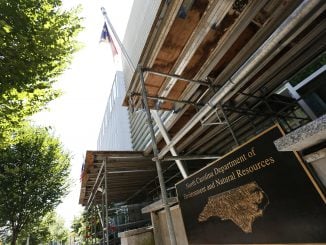
RALEIGH — The former secretary of the N.C. Dept. of Environmental Quality, who now serves on the state’s environmental rulemaking commission, has proposed rulemaking that would make money exchanged for permits illegal. Emails obtained by the North State Journal through public records requests show that Donald van der Vaart has proposed two motions before the N.C. Environmental Management Commission arising from his “concerns regarding the agreement between the Governor’s office and the Atlantic Coast Pipeline (ACP) partners that described payments by the ACP partners to an escrow account controlled by the Governor.”
Emails between van der Vaart and Stanly Meiburg, the chairman of the EMC who was appointed by Gov. Roy Cooper, show that van der Vaart strongly opposes payments in exchange for permits. However, van der Vaart offered an alternative if the commission does not agree. If the commission decided to allow officials to require payment for permits, van der Vaart said they should be regulated. A rule allowing additional payments for permits “must include strict criteria, procedures, and limitations for consideration of any payment by a permit applicant,” said van der Vaart.
The context for van der Vaart’s motions was provided to all of the commission’s members in a Feb. 10 email where he said, “I have a concern regarding the possible exchange of environmental permits for money.” Van der Vaart then quoted the executed memorandum of understanding between the ACP and Cooper’s office where the government agreed to refund any payments made by the pipeline if the project was not approved by the state or did receive the necessary permits.
In a May 22 email to Meiburg, van der Vaart said, “I am strongly opposed to any mechanism that exchanges money for permits. Such an arrangement is rife with the potential to corrupt the permitting processes.” The former McCrory cabinet secretary then said that once monetary payments to regulators is introduced, the agency would be motivated to maximize the payments it received from permit requestors. “To preserve proper processing of permits requires that consideration of a monetary payment by the applicant be precluded by rule,” said van der Vaart.
The motions proposed by van der Vaart present two opposing policy stances. His preferred language would “instruct the Department [DEQ] to draft a rule that would prohibit any agreement between third parties, including permit applications, and executive branch government officials that exchanges funds or anything of value for permits granted and/or maintained by the Department under the authority of the EMC.” His alternative motion would require regulations defining the conditions under which a permittee could be required to enter into an agreement to pay for a permit.
In a June 23 email to van der Vaart, Meiburg said the motions would be referenced in the agenda for the July meeting of the commission, but the motions would first be considered by the Steering Committee according to “normal procedure” for rulemaking. Meiburg said that the motions could be considered at the September meeting of the committee before they could be considered by the full commission.
Questions surrounding a $57.8 million agreement between Cooper and the ACP have lingered since the deal was announced in January of 2018. The N.C. Republican Party called for a federal investigation of the agreement saying it appeared to be the “worst example of pay to play politics.” The Republican-majority General Assembly launched an investigation in 2019 that culminated in a report from an investigative firm that found Cooper “improperly used the authority and influence of his office with regard to a $57.8 million ‘mitigation fund’” but did not personally benefit from the deal. Cooper’s administration said the report was “wrong, and it is full of inaccuracies and contradictions that clearly ignore inconvenient facts.”
The ACP project was recently canceled by Dominion Energy and Duke Energy. In a joint statement, the companies blamed “increasing legal uncertainty that overhangs large-scale energy and industrial infrastructure development in the United States.”
“The public deserves a permitting process that is fair,” said N.C. Sen. Paul Newton (R-Cabarrus). “An applicant is in a horrible negotiating position with the government if they can be required to pay.”
Newton, who was an executive at Duke Energy before joining the state Senate, said, “no state official should be allowed to extract more value than a permit requires. If an applicant meets the legal standard, the permit should be granted without the requirement of additional compensation.”
The Environmental Management Commission next meets July 8 in Raleigh.



